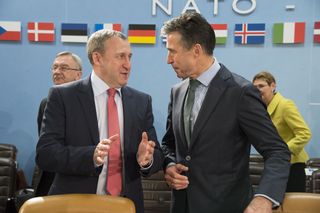Can NATO Contain Russian Advances?

Following its controversial annexation of Crimea, Russia has claimed that it is now withdrawing troops from its border with Ukraine, but NATO officials have expressed doubts that the military power will pull back anytime soon.
"Unfortunately, I cannot confirm that Russia is withdrawing its troops," NATO Secretary General Anders Fogh Rasmussen said today, as quoted by CNN. "And this massive military buildup can in no way contribute to a de-escalation of the situation."
The current geopolitical chess match in Crimea and Ukraine shines a bright light on NATO and its historical role as a counterweight to Russian aggression. [The 10 Epic Battles That Changed History]
What is NATO?
NATO, or the North Atlantic Treaty Organization, formed in 1949 as the clouds of World War II still hung over much of Europe.
After the Soviet Union blocked Allied access to parts of Berlin in 1948, and Germany was split into two separate nations, the United States and European nations (including France, the United Kingdom, Canada, Italy and Iceland) responded by signing the North Atlantic Treaty.
The treaty states that member nations will respond collectively to an attack against any individual NATO member. Participating countries are not obligated to respond with military force, but can choose to support other members with political, economic or other forms of aid.
Sign up for the Live Science daily newsletter now
Get the world’s most fascinating discoveries delivered straight to your inbox.
NATO's mission
"NATO's essential purpose is to safeguard the freedom and security of its members through political and military means," the Brussels-based group's website states.
NATO has also expressed a commitment to "democratic values" and the sharing of resources that will enhance the defense and security of member nations by preventing conflict.
But the group's embrace of military action is unambiguous: "If diplomatic efforts fail, it has the military capacity needed to undertake crisis-management operations," the website states.
Who's in NATO?
Currently, NATO membership stands at 28 nations. The original members from 1949 are Belgium, Canada, Denmark, France, Iceland, Italy, Luxembourg, Netherlands, Norway, Portugal, the United Kingdom and the United States.
In the years since those founding members signed, seven additional nations have joined NATO: Greece, Turkey, Germany, Spain, the Czech Republic, Hungary and Poland.
In 2004, one year after NATO took command of the coalition of nations fighting in Afghanistan, another set of countries joined: Bulgaria, Estonia, Latvia, Lithuania, Romania, Slovakia and Slovenia. In 2009, Albania and Croatia gained membership.
Besides its 28 member nations, NATO has strategic partnerships with other countries through its "Membership Action Plan," which offers assistance and advice to nations seeking membership in NATO. Four countries are currently trying to join NATO through those plans: Georgia, Bosnia/Herzegovina, Montenegro and the Macedonian Republic.
NATO and Ukraine
For years, Ukraine and NATO have been slow dancing toward membership, but it's been a complicated pas de deux. In 1997, a formal NATO-Ukraine Commission was created within NATO to facilitate efforts toward membership. In addition to staging joint military exercises, Ukraine joined NATO's anti-piracy missions in the Indian Ocean in 2013.
But Ukraine also has a long-standing relationship with Russia, and the two associations are somewhat incompatible: Russia has consistently opposed NATO expansion, which the country views as an economic, political and military threat.
In 2010, Viktor Yanukovych won the presidency of Ukraine. As part of his pro-Russian agenda, Yanukovych declared that Ukraine would no longer pursue NATO membership, instead strengthening bonds with Russia.
Russia and NATO
Yanukovych's ouster in a February 2014 coup triggered a hard-hitting Russian response, which included annexation of the Crimean peninsula, formerly part of Ukraine. Russia has also announced a sharp increase in the price Ukraine would pay for Russian natural gas ($385.50 per 1,000 cubic meters, up from $268.50, CNN reports).
These Russian maneuvers have alarmed many in NATO, which has announced a series of joint military exercises that would put NATO forces in close proximity to Russian troops.
"Another important aspect of relations is the support given by NATO and individual allies for Ukraine's ongoing reform efforts, particularly in the defense and security sectors," NATO said in a statement. "These reforms are vital for the country's democratic development."
Follow Marc Lallanilla on Twitter and Google+. Follow us @livescience, Facebook & Google+. Original article on Live Science.

Most Popular

